- Home
- Jana Oliver
Madman's Dance (Time Rovers) Page 23
Madman's Dance (Time Rovers) Read online
Page 23
Balance? “Will it make the ants go away?”
“Possibly.” He dropped into a crouching position and then shifted one foot and then another behind him while he spread his hands in the air.
“What is that?”
“White Crane Spreads Its Wings,” he replied.
“All those things have names?”
“Yes.”
Now that was interesting. Cynda stood near him, watching what he was doing, trying to copy it. She couldn’t come close and nearly fell to the matting. She stumbled around and then regained her footing.
He gracefully finished the current movement. “If you’re interested in learning a few forms, I’ll be happy to teach you.”
She thought about that. “Would the shrinks like me doing this?”
His eyes twinkled with mischief. “Probably not, since it’s a martial art. I don’t think they’d like you to learn any new ways of harming people.”
That settled it. “Show me what to do,” she said.
Chapter 24
Friday, 2 November, 1888
Old Bailey (Central Criminal Courts)
The courtroom was abuzz when Keats entered and positioned himself in the dock. He’d expected as much. The morning had brought ill news with his breakfast: Lord Wescomb, his staunchest defender, had been shot on the street in full view of his wife.
Although Wescomb would survive, Keats was bitter at the turn of events. Kingsbury had said he would continue in Wescomb’s stead, but Keats felt unsure of the young barrister’s abilities. To think someone would try to kill a peer of the realm just to smooth his way to the gallows was almost beyond his comprehension.
The trap is closing. Wescomb was going to save me, and now they’ve ensured he won’t.
Staring forward into the courtroom, he immediately noticed a woman. She wasn’t young, but possessed a classic beauty.
Lady Sephora Wescomb.
Keats was astounded to see her here, but there she was, dressed impeccably, her head held high. In her own way, she was telling the world that her husband was not gravely injured. If he had been, she would be at his side. It was a powerful statement to whoever had dispatched the assassin.
Seated next to her was Alastair, and next to him the young woman he’d seen at the inquest, Evelyn Hanson. Alastair turned toward her and said something. She nodded solemnly and patted his arm.
Good for you, my friend. You deserve some happiness for a change.
Judge Hawkins entered and the moment after he settled into his chair, he peered down at the junior barrister. “Mr. Kingsbury, I have your note regarding Lord Wescomb’s injury. How is he this morning?”
“Improved, my lord.”
“That is reassuring news. Please send my regards, will you?”
“Yes, my lord.”
“Is it your intention to ask for a continuance?”
“No, my lord.”
The judge gave him a perplexed look. “You are certain of that, sir?”
“Yes, your lordship. Lord Wescomb is most keen that our client’s case be concluded.”
“Well, I see,” the judge replied in a tone that indicated he didn’t think that was wise. “Then let’s carry on.”
“Thank you, your lordship. I wish to call forward Mr. Quincy Leonard.”
Keats cocked his head. Leonard was the chap who printed his cards. What was Kingsbury up to?
After the oath, Leonard testily explained that the card found in Miss Hallcox’s room was not of his manufacture, and did not match the ones in Keats’ rooms. Someone, he said, had created a decent imitation, but not the real thing.
“How can you be so sure?” Kingsbury quizzed.
“Not the same quality at all. I use only the best card stock. This,” he said, dismissing the evidence with a distasteful flick of his wrist, “is decidedly second-rate. I would not give such a respected customer such shoddy merchandise.”
Keats hid the smirk behind his palm.
After a brief recess, the jury returned to hear the final statements in the matter of the Crown vs. Jonathon Davis Keats. It would be up to Kingsbury to speak of what was in Keats’ heart, for by law the prisoner was not allowed to testify in his own defence. Uttering a silent prayer, Keats watched the young barrister rise from his seat. Would he be able to rally the jury’s sentiments in the prisoner’s favor?
“This has been a troubling case from the onset,” Kingsbury began, “for not only has a woman lost her life, but Detective-Sergeant Keats has lost what he holds most dear—his career.”
The barrister eloquently described Keats’ years on the force, his glowing record as he’d served both at Arbour Square, and at the Yard. As he spoke of certain events, Keats’ mind relived those moments. Like a young spaniel, he’d been keen to hunt down those who would flaunt the law. Early in his career, he’d caught gangs of robbers, forgers, and even put Desmond Flaherty in jail. This time, the Fenian had outwitted him.
Kingsbury shifted tone. “Esteemed members of the jury, as you weigh the facts, it is vital to remember that there is a dearth of physical evidence that places the sergeant at the scene of the crime. His hair was not found in the victim’s bed, though evidence of three other paramours were. Who left behind those black strands? It was certainly not my client.
“You’ve been shown a riveting demonstration of how the murderer was considerably taller than the detective-sergeant. It is only Mr. Landis’ testimony that has placed my client in the dock. I submit that the butler’s propensity for drink and stark grief at the terrifying death of his mistress has led him to point the finger of guilt erroneously. He clearly harbors ill will toward the sergeant for reasons unknown. As his attention was elsewhere while his mistress died, is it not possible this false accusation is his way of atonement?”
The jurors were held in rapt attention by the young barrister’s oratory. Wescomb would be proud.
Keats’ eyes wandered. In the spectator’s gallery, he caught sight of a familiar figure—Clancy Moran. Their eyes met briefly, then Keats looked away with a twinge of regret. Clancy would never get the reward money now.
“We must admit that the detective-sergeant is guilty on one count,” Kingsbury said, addressing the twelve men. “He will admit to the sin of obsession. Fearing for the public safety, he sought to bring Desmond Flaherty and his associates into custody, to prevent future attacks upon this city and its populace.”
Justice Hawkins leaned forward in his chair, the barest hint of a frown on his face.
The barrister turned introspective. “The very second Keats learnt of Miss Hallcox’s death, he should have turned himself in to the constabulary in Ingatestone. He did not. That was a grievous error on his part, and he readily admits it. Yet, when taken in context with this man’s brilliant career, it is but a momentary lapse of judgement.
“Jonathon Keats is a copper, through and through. He was willing to risk everything—his life and his career—to do his duty. He is only guilty of the sin of obsession, not murder. It is my hope that justice will prevail in your hearts and you will set this man free so that he may continue the fine work at which he excels.”
If I am found guilty, it is not because my barristers lacked ardor.
Now it was Arnett’s turn. The jurors shuffled in their seats, eager to hear what he had to say. The barrister smiled politely in Kingsbury’s direction. “My learned colleague has given us a glimpse of a promising young policeman’s career. The prisoner has gone from strength to strength, excelling at each of his tasks. Until that fateful night.”
He turned toward the jury. “Admittedly, the victim was hardly a paragon of virtue, but she knew precisely what it would take to bring the prisoner to heel. That was her undoing.
“In the course of the investigation, we learned that the prisoner argued with Miss Hallcox on the night she died and left, as the butler has testified, in a fine fury. Later, he returned and spent time in her bedroom. To cover his crime, the prisoner spun a fantastical tale worthy of any Pe
nny Dreadful. He claims he encountered his arch enemy in an alley in Whitechapel.”
Arnett took a step forward. “Allow me to paint this picture: five Fenians, all, no doubt, armed, have trapped a single police sergeant, an individual they despise, in a dark alley. An arch criminal finally has the prisoner within his grasp. Why let him live? Instead, the sergeant claims he was accosted, imprisoned in a coffin, and ferried into the country.” Arnett shook his head in dismay. “Such a vivid imagination.”
He drew himself up. “It is true that Miss Crickland saw the prisoner in Whitechapel, but she was uncertain of the time. We have heard how the prisoner pawned his boots in Ingatestone, but that in itself is not sufficient to acquit him. It only proves that he was in that city after the murder. It is the prosecution’s belief that the prisoner is guilty of the heinous crime of which he is charged. As our learned colleague observed, the prisoner suffers a deadly obsession—the need to capture the elusive anarchist. That mania clouded the sergeant’s mind. I contend that he returned to Nicola Hallcox’s house, perhaps used his skills to pick the front door lock, and ascended to her bedroom. It is my belief that Miss Hallcox never possessed any information about the Fenian, but used that ploy to lure the prisoner into her bed. She played him for a fool.”
Arnett paused and took a deep breath. “Her deception came at a very high cost. After their illicit sexual congress, I believe she revealed the truth: that she had no information and was suffering from a grave disease. When he grew wroth at the deception, she scorned him.”
The prosecutor looked up at him. “Any reasonable man would be angry at having been played for a fool. For the prisoner, it was more than his pride on the line. Not only might he become syphilitic himself, but his golden opportunity had been ruthlessly torn from him.”
Arnett swiveled toward the jury. “In a moment of inhuman rage, Detective-Sergeant Jonathon Keats strangled the life out of Nicola Hallcox. He then arranged her body in that grotesque and obscene pose to display his contempt for the woman who had so easily duped him.”
No!
“The death of Nicola Hallcox is a travesty that cries out for judgement. I ask you, the members of the jury, to weigh the evidence and find this tormented man guilty of the crime of willful murder.”
Some of Justice Hawkins’ charge to the jury filtered through the thick fog into which Keats had stumbled. It sounded evenhanded, as the judge weighed the evidence presented from both the defence and the prosecution.
Finally, the justice explained, “A man’s life lies in your hands. If you are not so convinced of the prisoner’s guilt, then he is entitled to be acquitted. If, however, you are satisfied that he did commit this crime, then it is your duty to say so without reservation. You must determine his fate. That is the wisdom of our law. ”
~••~••~••~
It had been the longest hour of Keats’ life. He’d spent it in prayer, fingers working the beads of his dead mother’s rosary. Now, as the jury filed in, he hoped God had heard his impassioned pleas.
As the Chaplain took his required place, muffled voices came from the gallery. They were taking bets. From what he could hear, they were split as to the outcome. His eyes hopped from juror to juror. None of them looked upward at the dock.
Please, God, you know I didn’t do this.
The Clerk of the Court asked, “Gentlemen, have you agreed upon your verdict?”
The Foreman of the Jury rose. “We have.”
“Do you find the prisoner guilty or not guilty of the murder of Nicola Therese Hallcox?”
The Foreman paused for a fraction of a second. “We find the prisoner guilty.”
Guilty. It hit with all the force of a sledgehammer blow to the gut.
Beneath him, he saw the stricken face of Lady Wescomb, a handkerchief pressed to her lips. Cousin Roddy stared upward at him in horror while Fisher closed his eyes, his lips pressed together in a thin line. Alastair bowed his head in defeat.
How could it have come to this?
The Clerk turned toward Keats. “Prisoner at the bar, you stand convicted of the crime of willful murder. Have you anything to say why the Court should not give you judgment of death according to law?”
His knees like jelly, Keats squared his shoulders and rose with as much dignity as he could muster.
“Yes, I do.” He cleared his throat. “I proclaim my innocence in this matter. I did not murder Nicola Hallcox. My only crime was the desperate need to capture Desmond Flaherty.”
As he spoke, he felt his fury rising at the injustice. He had dedicated his life to the law, and it had failed him when he needed it the most.
They’re going to hang me. What the hell does it matter now?
He steeled himself and raised his voice, pointing his words directly at the jurors.
“By Almighty God, I swear that I did not pursue my obsession purely for the chance of a commendation or an advancement in rank. I made the decision to continue my hunt for Desmond Flaherty because he still has at the very least, a wagonload of gunpowder and a substantial amount of dynamite, with which he threatens this city at this very moment!”
As Arnett began to sputter, Kingsbury delivered a subtle nod, along with a hint of an approving smile. Keats was finally saying what he and Wescomb had been denied.
Justice Hawkins called for order as the courtroom swirled into a tempest of voices. Keats took advantage of the mayhem to seek out Fisher in the crowd. His efforts were amply rewarded: his superior’s face held an expression of awe.
“Mr. Keats,” the justice warned. “You know—”
“With all due respect to your lordship and the Crown, the truth has not been heard in this courtroom. I do not fault you, my lord, but those in the government who hide behind their intrigues and allow the innocent to suffer.”
“Is that your statement?” Hawkins demanded.
“Nearly.” Keats took a deep breath, his heart pounding so hard it threatened to choke him.
“I have served with pride, alongside men of singularly dedicated purpose. To that end, I ask that my conviction not tarnish the reputation of my fellow officers at Scotland Yard. This stain should fall on my shoulders alone.” He gave a nod to indicate he was done.
Justice Hawkins eyed him sternly. “Jonathon Davis Keats, you have been convicted, upon evidence, of the murder of Nicola Hallcox. I find it detestable when a citizen violates the laws. It is indefensible when a police officer does the same. No matter your reasons, noble or otherwise, for the crime of which you have been convicted our law knows but one penalty—the penalty of death. I recommend that you make your peace with Almighty God before you stand before His throne. Perhaps He will see it in His heart to pardon you for this hideous crime.”
Keats’ breath caught in his chest as Justice Hawkins donned the black cap.
“You will be taken hence to the prison in which you were last confined and from there to a place of execution where you will be hanged by the neck until you are dead and thereafter your body buried within the precincts of the prison. May the Lord have mercy upon your soul.”
The Chaplain murmured, “Amen.”
Keats sank into the chair, proud of his defiance. By evening, his final statement would be in all the papers. There would be hell to pay in Parliament as questions were asked and answers avoided. At long last, this festering sore would be laid open to the world.
He nodded to himself, pleased. He’d done all he could.
That’s what being a copper is all about.
Chapter 25
2058 A.D.
TEM Enterprises
Time passed. A new year began. The shrinks came and went less frequently now. That was a blessing. Cynda had begun a sand drawing, just on a whim, but it had taken hold of her. The sand dragon now had wings and a massive tail. It seemed to her that the more it grew, so did she. Somehow the two were connected.
Like a jagged wound, her mind continued healing in little patches. One moment she wouldn’t remember the name of an o
bject or a person, and then it would be there. Sometimes she’d forget it again, but more frequently the words found a suitable niche in her muddled mind.
Hours working the sand and doing Tai Chi with Morrisey had calmed the fire ants under her skin. It hadn’t gone smoothly. Some days she would rant at him, furious when she couldn’t remember a move he’d patiently taught her over and over. Other days it went better. Memory was still an issue. Always would be.
“Time is a great healer,” Morrisey often said whenever things seemed rough for her. Cynda often wondered at his endless patience. She couldn’t help but notice there was more gray at his temples now.
At Morrisey’s suggestion she’d begun another tradition: every night she asked the computer to pull up a few of her run reports. It seemed to be the best means to fill a few more holes in her past and for her to understand what kind of person she’d been. What it was like to be a Rover. When Ralph had realized what she was doing, he’d taken to joining her. He said it was in case she had any questions. She suspected it had more to do with loneliness than anything.
The reports read like fiction. Could she have rescued a half-dozen tourists from lions in a Roman Coliseum, or spent time in the court of King Henry the Eighth? The old Jacynda Lassiter had dined in the same room as Elizabeth the First, watched the defeat of the Spanish Armada. She’d been at the Battle of Trafalgar and witnessed Lord Nelson felled by a sniper’s bullet, and later, his corpse being packed into a water cask filled with brandy for the mournful journey to England.
“You’re frowning a lot,” Ralph observed over the sound of the vintage music coming out of his equally vintage headphones. He’d never taken to the ear implants. “Something bugging you?” She mimed for him to take them off, and he complied.
“Is this all true?” Cynda asked, gesturing toward the screen.
“For the most part. You didn’t always put everything in the reports, though. TPB can come down hard on a Rover if they think something was weird about a run.” Ralph was rapidly becoming her personal bellwether. He seemed to relish the role. It was a way for them to mend the rift between them.

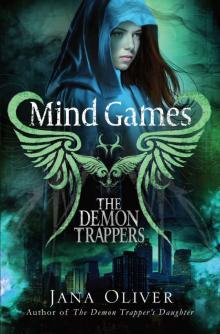 Mind Games
Mind Games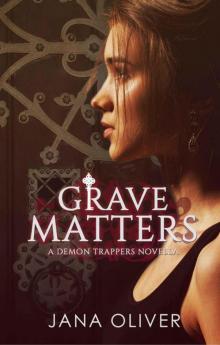 Grave Matters
Grave Matters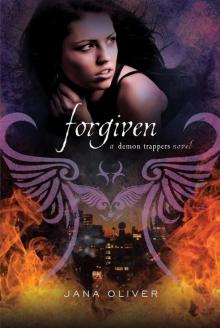 The Demon Trappers 3: Forgiven
The Demon Trappers 3: Forgiven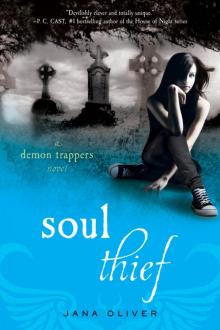 Forbidden
Forbidden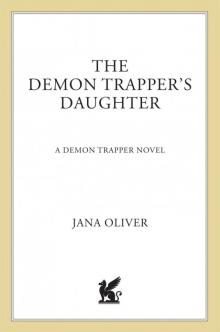 Forsaken
Forsaken Briar Rose
Briar Rose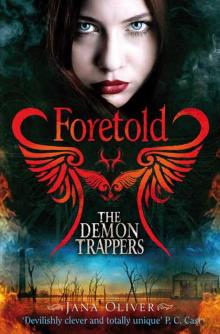 The Demon Trappers: Foretold
The Demon Trappers: Foretold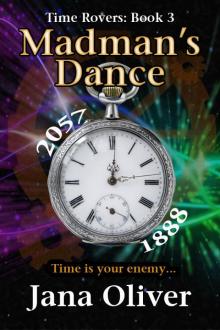 Madman's Dance (Time Rovers)
Madman's Dance (Time Rovers)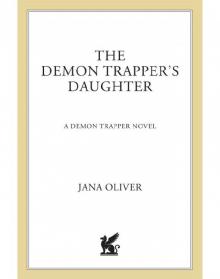 The Demon Trapper’s Daughter
The Demon Trapper’s Daughter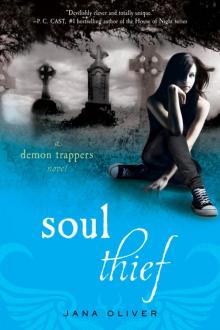 Soul Thief-Demon Trappers 2
Soul Thief-Demon Trappers 2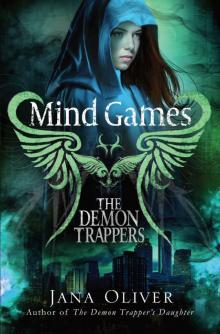 Mind Games (Demon Trappers Book 5)
Mind Games (Demon Trappers Book 5)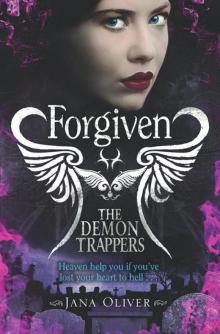 The Demon Trappers: Forgiven
The Demon Trappers: Forgiven